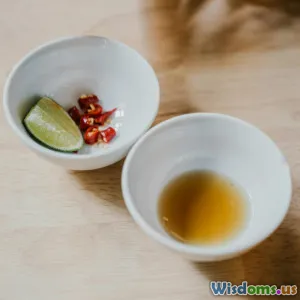
Culinary Journeys for Your Health
8 min read Explore how culinary journeys enhance health through travel, cuisine, and lifestyle choices. (0 Reviews)
Culinary Journeys for Your Health
Introduction
Travel offers more than just picturesque landscapes and diverse cultures; it serves as a gateway to experience culinary traditions that significantly impact our health. Open your senses to vibrant flavors and wholesome ingredients that not only tantalize the taste buds but also enhance our well-being. Answering the question, “How can traveling and exploring cuisine contribute to a healthier lifestyle?” leads us to fascinating insights that unite health and culinary arts in wonderful ways.
According to the World Health Organization (WHO), diet contributes significantly to our overall health. Thus, understanding how culinary practices from various cultures can shape and improve our dietary habits can help us lead healthier lives. Multiple studies have shown that incorporating diverse and nutritious foods can reduce the risk of chronic illnesses.
So, as you prepare for your next adventure, consider the impact of not just the locations you visit but the culinary journeys that await you.
The Historical and Cultural Relics of Food
1. Mediterranean Diet – An Ancient Tradition
The Mediterranean diet has garnered immense popularity in recent years, but its roots stretch deep into the Mediterranean region’s historical context. Consisting primarily of fruits, vegetables, whole grains, nuts, and healthy fats like olive oil, this diet has demonstrated benefits including improved cardiovascular health and longer lifespans.
Several studies propose that adopting a Mediterranean diet can reduce the risk of heart disease by 30%, promoting a healthier lifestyle. Countries such as Greece and Italy have long enjoyed these benefits, blending delicious flavors with nutrient-rich ingredients passed through generations.
2. Exploring Asian Cuisines – Balance and Harmony
When it comes to traditional Asian cuisines, the balance of flavors and nutrition is paramount. For example, Japanese cuisine focuses on seasonality and presentation, emphasizing fish, rice, and vegetables. Miso soup, a staple dish loaded with probiotics, aids in digestion and is linked to longevity.
A fascinating study from the Journal of Nutrition indicates that individuals who consume an Asian diet — rich in vegetables, lean proteins, and healthy fats — have a significantly lower chance of developing metabolic syndrome. Venturing into countries such as Thailand or Japan not only immerses you in rich cultural experiences but also opens doors to food that nourishes the body and mind.
Culinary Retreats: The Art of Cooking for Wellness
3. Focus on Mental Well-being
Culinary retreats growing in popularity provide the perfect opportunity to blend vacation with health. These unique programs focus on cooking classes that teach participants about nutrient-rich ingredients, mindfulness in food preparation, and the joy of sharing meals — factors that all play significant roles in mental well-being.
Example: A wellness cooking retreat in Tuscany allows you to not only learn how to prepare traditional Italian dishes using fresh, local ingredients but also connects you with nature. Cooking alongside like-minded individuals and sharing meals aids in building community, reducing stress, and fostering happiness.
4. Personalized Nutrition Experiences
Customized culinary tours, such as those offered in Tulum, Mexico, integrate personalized dietary plans with cultural cooking classes. This approach addresses individual health goals and preferences—be it vegetarian, gluten-free, or focused on detoxification. By selecting foods that align with your health needs and learning from local chefs, participants witness firsthand how food can be therapeutic.
Traveling Deeper: Food Markets and Street Eats
5. The Vibrancy of Local Markets
Another way to engage with the culinary culture in a health-promoting manner is by visiting local food markets. Markets not only provide fresh produce but also allow travelers to interact with local vendors, learning about the stories behind their ingredients.
Consider Bangkok's Chatuchak Market, where street vendors serve fresh tropical fruits that brimming with vitamins and antioxidants. These experiences encourage consumers to make healthier selections and try new varieties of fruits and vegetables, fostering better eating habits when returning home.
6. The Health Benefits of Street Food
Street food, often perceived as unhealthy, can surprise many with its nutritious options. For instance, Vietnamese street food includes fresh herb-laden dishes such as Pho, a bowl of rice noodle soup brimming with fresh vegetables and lean proteins. Eating such foods prepared in a respectful culinary tradition can provide healthy nourishment without sacrificing taste.
Understanding the Impact of Locally Sourced Ingredients
7. Embracing Seasonal Eating
When traveling, take time to discover dishes made with locally sourced ingredients. Eating seasonally ensures that produce is at its peak in flavor and nutritional value. A visit to a vineyard in Napa Valley during the harvest season allows travelers to enjoy organic wines, culinary experiences, and an insight into sustainable practices.
Research from the American Journal of Clinical Nutrition suggests that the benefits derived from seasonal eating can substantially improve diet quality and promote better health outcomes. Plus, it fosters a deeper appreciation for what each culture can offer through its culinary landscape.
8. Cultivating Gratitude and Connection
The emotional and psychological connections forged while sharing meals with others cannot be underestimated. Cultivating relationships with local communities through shared dining experiences can change the way we appreciate food. Traveling can lead us to new traditions, paving the way for emotional healing and a healthier mindset.
Conclusion
Culinary journeys stand out as a unique and enriching way to elevate one’s health and well-being. From understanding cultural backgrounds that inspire nutritious diets to engaging in culinary retreats that immerse the mind and body in healthful practices, the quest for culinary experiences has the potential to profoundly influence our life choices.
As you plan your travels, prioritize culinary experiences that not only excite your palate but also enhance your health. Engage with local cultures, learn, savor, and return home with newfound enthusiasm for nutritious living. Embrace culinary tourism to not only sate your appetite for unique flavors but also for foster a holistic approach to health through food.
Travel for your health, delight in the culinary wonders and live a life filled with delicious, nourishing choices.
Rate the Post
User Reviews
Popular Posts





















